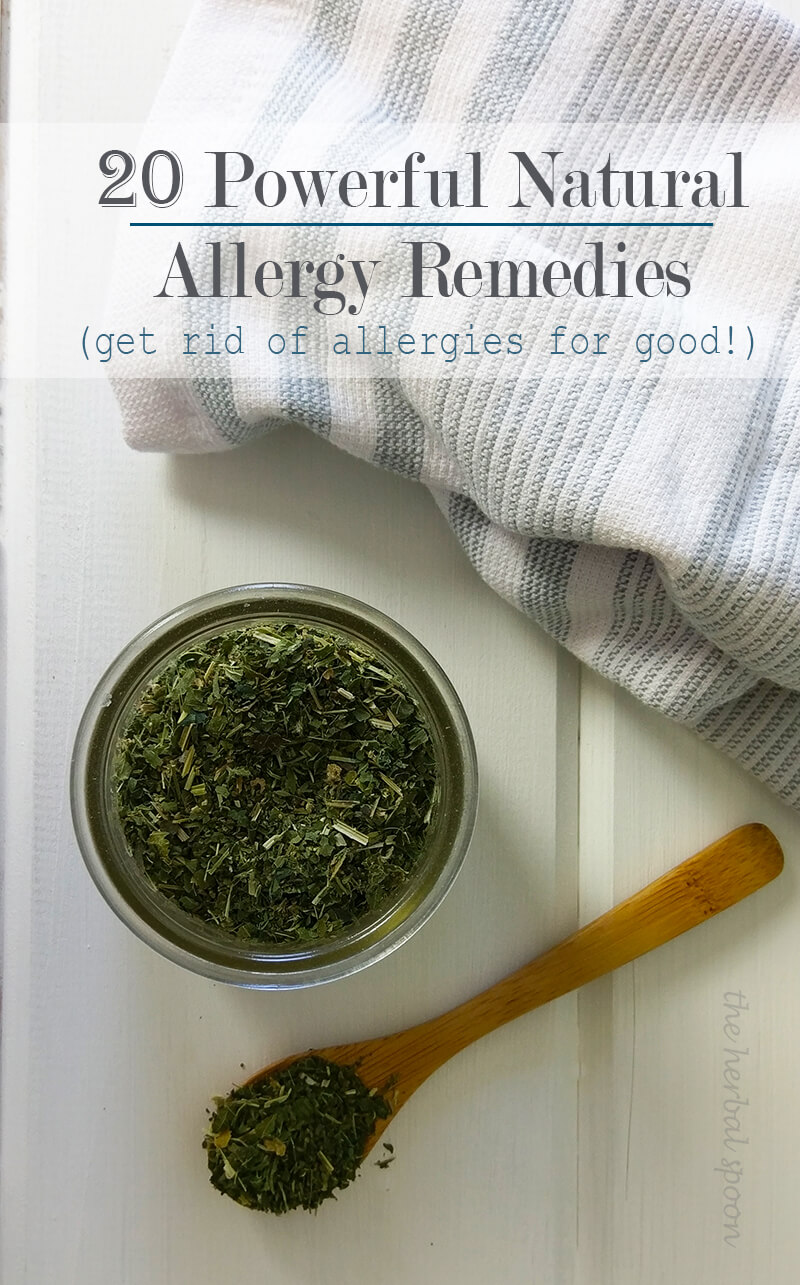
I used to dread the sneezy, itchy, stuffy feeling of allergy season, but not anymore. Inflammation causes many health issues, from arthritis to allergies. But thankfully it’s possible to reverse inflammation and allergies for good! These simple home remedies for allergy relief really work.
What are Seasonal Allergies?
Seasonal allergies are sometimes called hay fever. The official term is allergic rhinitis. Perennial allergic rhinitis is when symptoms last all year long. According to Mayo Clinic allergy symptoms can include:
- Runny nose
- Congestion
- Sneezing
- Coughing and sinus drainage
- An itchy mouth and throat
- Tiredness
Everyday things like pollen, dust, and pet dander can trigger allergic reactions. Our bodies then release antibodies and become inflamed in an attempt to fix the problem.
Allergy Relief Without Meds
When I was young I vividly remember the dread of allergy season. My swollen tonsils ached, I sneezed constantly, and the unbearable itch drove me crazy. I was on prescription allergy medications at the ripe old age of 8, but I hated them. Lilac scented spray up the nose isn’t my idea of fun.
As a teenager, I cleaned up my diet, ate more organic food, and my allergies disappeared.
Several years ago I was exposed to toxic black mold (which took a major toll on my health) and my allergies flared. However, with a clean diet and the right home remedies for allergy relief my symptoms are under control. As I detox from the mold I’ve noticed even fewer allergy symptoms.
What Causes Seasonal Allergies?
Although pollen and dust can cause histamine reactions, they’re not the real problem. Medications, antibiotics, pesticides, and other toxins damage the gut so it becomes permeable (aka leaky gut). A damaged gut lets particles slip through and the body attacks. Allergy symptoms are the body’s way to get rid of the invader.
Our microbes play another important role that prevent allergy symptoms.
“Every mucosal surface on your body is colonized by a distinct group of microbes, including your gut lungs and nasal passages. Far from causing harm, these microbes “teach” your immune system to tolerate dietary proteins and other harmless allergens in the environment.” – (Kresser, 2019)
Strong Bodies For Natural Allergy Relief
Microbiome damage paired with a weak adrenal, immune, and digestive system equals allergies. Here are some tips to nurture gut health:
- Focus on real, unprocessed foods
- Use natural sweeteners and avoid processed inflammation causing white sugar
- Avoid pesticides in food and water
- Use toxin-free household products (cleaners, air fresheners, bleach, etc.)
- Avoid unnecessary medications and antibiotics

#1 Clean Your Plate to Ditch Allergies for Good
Certain foods can cause inflammation and leaky gut, while others strengthen the body. Often food sensitivities don’t show up on tests, so an elimination diet, like this one, is a better way to find out. Here are the top offenders to ditch for allergy relief.
Ditch the Dairy … Maybe
Even raw or organic dairy can cause inflammation, congestion, and worsen leaky gut for some. For those with allergies it’s best to get rid of the milk products, at least during allergy season. If you do want some dairy, yogurt has live probiotics which help gut health and is easier to digest (Romm, 2018).
Certain types of milk are thought to cause excess phlegm and other health problems. Cow breeds like Jersey and Guernsey make A2 milk, which is easier to digest and healthier than A1 milk. If you’re going to drink milk, local, raw, A2 milk is the best option (Mercola, 2010).
Wheat and Refined Carbs
White flour and other processed grains do a number on gut health. Many people are also sensitive to wheat proteins, like gluten. Farmers often spray wheat with toxic glyphosate which damages gut health even more. Sadly, even organic wheat in the US has high levels of glyphosate (Thomas, 2014).
#2 Do a Healing Diet
GAPS, AIP (autoimmune paleo), and the 4R program are all used to reverse allergies. The diets have some differences, yet they approach the problem the same. Healing diets eliminate inflammatory foods that trigger allergies. They also highlight nourishing foods to strengthen the body. The key to healing allergies for good is to fix gut damage and eliminate toxins.
Eating for Allergies
It’s important to drink plenty of healthy fluids to flush out toxins and irritants that cause inflammation. Healthy fats like grass-fed butter (if tolerated), coconut oil, and olive oil help lubricate tissues so they function well (McDonald, n.d.).
How to Treat Allergic Rhinitis Naturally
Eating clean, avoiding toxins, and healing the gut are vital to reversing seasonal allergies for good. In the meantime, those pesky symptoms can get on the nerves.
The good news? Even those on allergy medications (like I was) can experience natural relief. In multiple studies, many ditched their allergy meds with diet changes and the right supplements.
Supplements should ideally be started 6 weeks before allergy season. Home remedies for allergy relief need time to strengthen the body’s systems to resist allergens (Mills & Bone, 1999). Even if allergy season is in full force there’s no need to panic. These allergy remedies help decrease inflammation, reduce histamine, and many provide immediate relief.
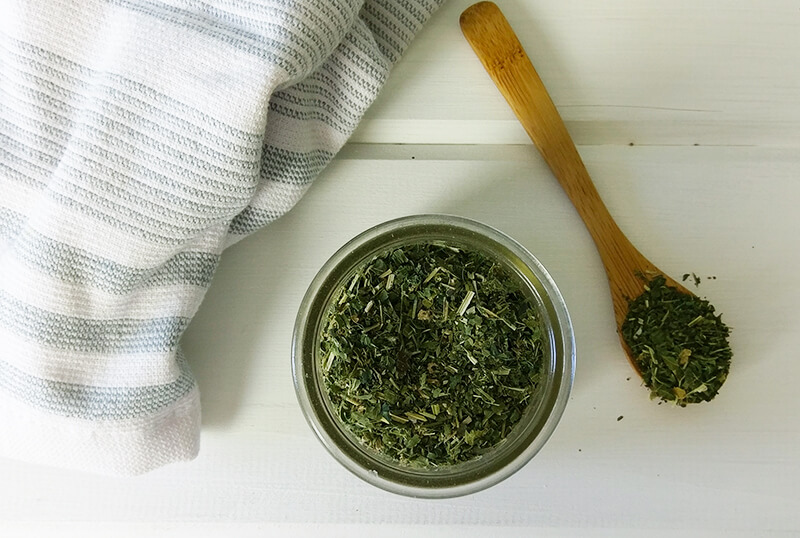
#3 Herbs for Allergies
The best offense is a good defense and the same is true with our immune system. Immune building herbs help the body be more resistant to allergens. Herbalist David Winston recommends echinacea to fortify the immune system and fight allergies. Winston goes on to say it may be necessary to treat allergies at a deeper level. This may include :
- Cleansing herbs like cleavers.
- Lymphatic detoxing herbs, like poke root.
- Herbs that stimulate bile production to aid digestion and the removal of toxins in the body. It’s no use to release toxins if the toxins never leave! These can include dandelion and globe artichoke.
- Herbs that cleanse and support the liver, like dandelion and milk thistle.
Our bodies have different detox pathways and when one doesn’t function well it can weaken the entire system. Our body can work like a well-oiled machine when we use herbs that target the different systems (Winston & Maimes, 2007).
#4 Reduce Stress
Stress can worsen allergies (and everything else). Researchers interviewed 179 allergy sufferers and found emotional stress caused more allergy flares (Patterson et al, 2014). Techniques like deep breathing, prayer, meditation, and minimizing stressful situations can help relieve allergy symptoms. Adaptogens, tonics, nervines and sleep aid herbs can also be added if necessary (Winston & Maimes, 2007).
- Adaptogens and tonics (help the body adapt to stressors): Eleuthero root, ashwaganda, and tulsi (holy basil).
- Nervines (support the nervous system): Lemon balm, catnip and chamomile.
- Sleep aids: Kava kava, passion flower, and hops.
Using Herbs so They Work
Herbs work best when they’re tailored to the individual. I haven’t given detailed herb information here for the sake of space. If you think it’s something you need I recommend researching an herb first to see if it’s the right fit. Matching random herbs to a condition can be ineffective at least and harmful at worst.
Don’t feel confident doing it yourself? A consultation with a qualified health practitioner can be helpful.
#5 Use a Neti Pot For Instant Allergy Relief
It’s gross, it’s weird, and results are instant. Nasal irrigation or nasal washes can be done with all sorts of contraptions, but my favorite is the humble neti pot. The water goes in one nostril and out the other, taking dust, allergens, and toxins out with it. You can see how I use a neti pot for fast allergy relief here.
#6 Use An Herbal Sinus Rinse
Herbal teas soothe and restore the throat, but they can do the same thing for nasal passages. Certain herbs tighten loose tissues that cause sneezing and a runny nose, while others calm inflammation. When blended together in the right way, herbal sinus rinses are a powerful natural allergy remedy. Get all the details on how to create a custom herbal sinus rinse here.
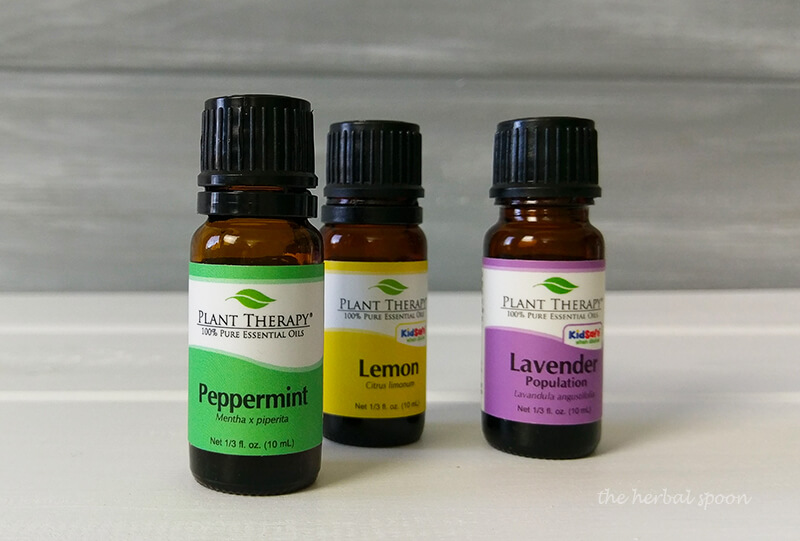
#7 Use Essential Oils for Allergies
Inhaling essential oils is the perfect way to address sinus issues as they go right to the source. In this study participants smelled a blend of frankincense, sandalwood, and ravensera essential oil. At the end of the trial the essential oil group had less allergy symptoms, better quality of life, slept better, and weren’t as tired as the placebo group (Choi & Park, 2016).
- Ravensera may not only reduce allergy symptoms, but could prevent the body from mounting an attack in the first place.
- Frankincense reduces allergy symptoms and calms inflammation.
- Sandalwood helps the nervous system. This oil elevates the parasympathetic nervous system. It also stimulates nerves in the nose for fewer allergic reactions.
#8 Lavender vs Steroids
This study looked at people with chronic allergies. The group that used lavender essential oil saw allergy relief similar to the group that used cortisone steroids. The cortisone group had less congestion and runny nose symptoms. The lavender oil group had less fatigue and confusion (Anushiravani et al, 2018).
While lavender essential oil may not be enough on its own to tackle every allergy symptom, it can be part of the natural solution.
#9 The Triple Threat for Allergy Relief
Lavender, lemon, and peppermint combined are a popular home remedy for allergies. These oils can be diffused or (properly) ingested. I’ll put 1 drop of each in a capsule, fill it to the top with olive oil and take 2-3 capsules a day when I need symptom relief. The following information comes from aromatherapist Julia Lawless.
- Lavender helps reduce histamine reactions and helps respiratory issues like bronchitis and asthma.
- Lemon, like lavender, eases respiratory issues with the added benefit of thinning mucus. I’ve found that lemon can thin mucus too much if there’s no congestion present, which results in lots of nose blowing.
- Peppermint improves congestion and excess mucus. It calms spasms to help coughing caused by a drippy nose and provides the feel of clear breathing. Mint also helps relieve headaches which can go along with allergies.
Who Shouldn’t Use This?
Internal use of peppermint can worsen acid reflux so use caution or avoid if this is an issue. Peppermint can also decrease breastmilk supply so don’t ingest if breastfeeding. It’s also advised to avoid ingesting essential oils while pregnant (Lawless, 2013).
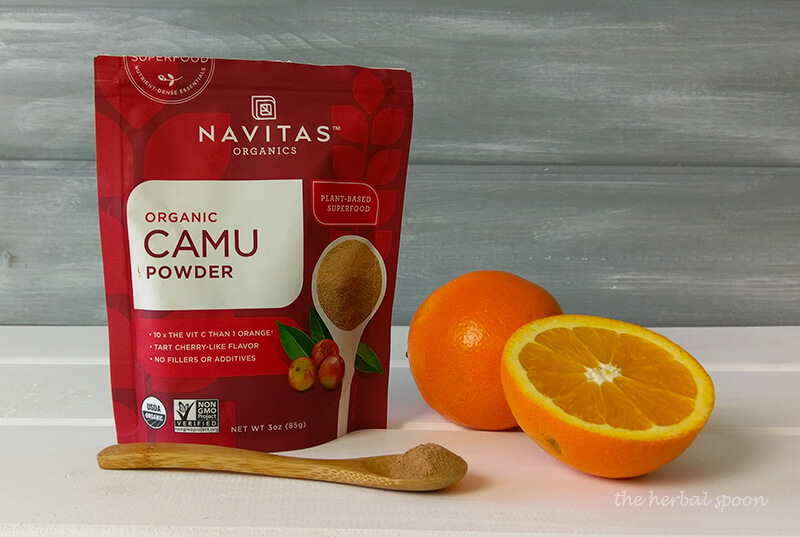
Supplements and Natural Remedies for Allergies
These are best taken 6 weeks before the start of allergy season to build the body’s systems. You don’t have to take every single item on the list, and different home remedies for allergies will work better for different people.
#10 Resveratrol
The antioxidant resveratrol lowers the body’s inflammatory response to help relieve allergies. In this study those who used a resveratrol nasal spray saw reduced allergy symptoms and less inflammation compared to the placebo group (Lv et al, 2018).
How to Use Resveratrol for Allergies
Resveratrol can be found in grape juice, grapes, vinegar, roasted peanuts, raw lingonberry, and wine. LinfoVir plus nasal spray can be found here, and resveratrol supplements can be found here. Massive doses of resveratrol (about 204 grams a day for the average 150 pound person) can cause cell damage, but it would be difficult to down that much (Mukherjee et al, 2010).
#11 Quercetin
Like resveratrol, quercetin is a potent antioxidant that shows promise for allergy relief. In this study quercetin helped prevent the body from releasing histamine and lowered inflammation. The suggested dose is 400-500mg three times a day. You can find quercetin supplements here. (Scalbert, 2015), (Mlcek et al, 2016).
Quercetin rich foods include:
- capers
- radish leaves
- fresh dill
- fennel leaves
- red onions
- garlic
- berries
- kale
- okra
#12 Vitamin C
Vitamin C is popular during cold season for immune support, but it also lowers blood histamine levels. The highest sources of vitamin C are guavas, bell peppers, kiwi, and camu camu berry. Camu camu berry powder is my favorite way to get whole food vitamin C (not synthetic isolated supplements). One teaspoon of camu camu has 760% of your daily value of vitamin C!
Men need at least 90 mg of vitamin C daily and women need at least 75 mg. If you take more than 2,000 mg of vitamin C though you might make a rush to the toilet or have other digestive issues (NIH, 2018). You can get whole food vitamin C powder (camu camu) here.
#13 Bromelain
Found in pineapple the enzyme bromelain helps provide allergy relief. Bromelain reduces inflammation in the nose, thins mucus, and is anti-inflammatory. The recommended dose is 500-2,000 mg daily (Helms & Miller, 2006). You can get bromelain supplements here.
#14 N -acetylcysteine (NAC)
N -acetylcysteine (NAC) may be a mouthful, but this antioxidant is great for alleriges. NAC helps thins mucus and reduces nasal inflammation. One animal study found that NAC prevented inflammatory cells from building up and reduced inflammatory markers (Guibas et al, 2013).
The recommended dose is 200-500 mg, 3 times a day. Too much can cause nausea, vomiting, and other digestive discomforts. You can get NAC here.
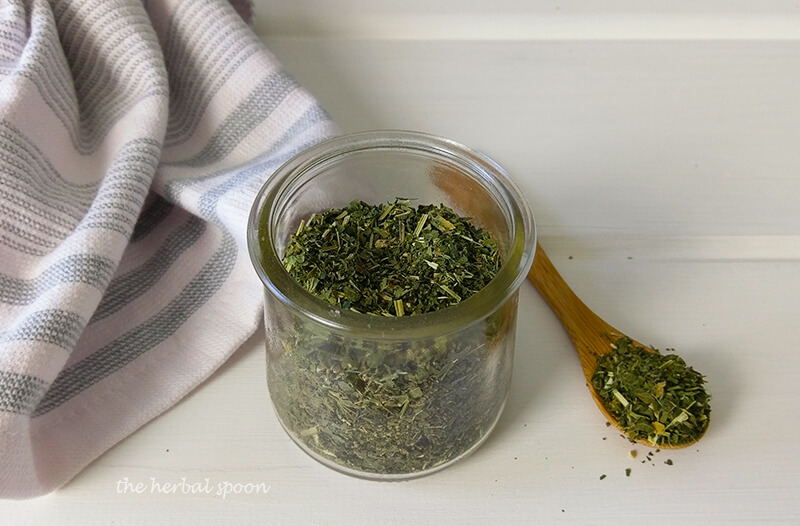
#15 The Best Herbs for Allergy Relief
Nettle is one of the most researched home remedies for allergy relief and abundantly available fresh in springtime. In one study allergy sufferers all saw symptom improvement after taking nettle, while 58% had zero symptoms. About half of the study participants said the nettle worked as well as their antihistamine medication (Helms & Miller, 2006).
Recommended nettle dosage is 8-12 grams a day of dried nettle, or 7-14 milliliters of nettle leaf tincture. I’ve had good success with dried nettle tea, however other herbalists say fresh is more effective (Mills & Bone, 1999). You can find nettle glycerite capsules here.
#16 Reduce Mucus and Clear Congestion
Anti-catarrhal herbs help clear extra mucus from the respiratory system. These are useful when everything feels plugged and there’s drainage, coughing, and nose blowing. Eyebright, elder, ground ivy, mullein, and goldenseal are all good options. These can be taken as a powder or made into tea and are best taken before meals. The following information comes from Principles and Practices of Phytotherapy.
#17 Eyebright
This herb is great for itchy, irritated eyes and also reduces extra mucus in the respiratory system. Eyebright tightens mucus membranes and is anti-inflammatory for when there’s lots of sneezing and an itchy nose. There’s some evidence eyebright is antibacterial and antiviral. This makes it useful for colds with their itchy, sneezy, wet symptoms.
Eyebright is generally safe with no known precautions. The recommended dose is 2-4 gram of herb made into a tea and drank 3 times a day. Tincture dosage is 2-6 milliliters of a 1:5 tincture 3 times a day. You can get eyebright tea here, and eyebright tincture here.
#18 Soothe Itchy Eyes
Eyebright tea can also be used as a soothing compress on the eyes to relieve itchiness, redness, and inflammation. Make a tea with eyebright and soak a cloth in the solution and lay it across the eyelids. Chamomile can be used with the eyebright to calm inflammation. Some recommend using eyebright tea (impeccably strained!) as an eye wash, but I’ve never been brave enough to try it!
#19 Spikenard for better Immunity
This isn’t the same spikenard referenced in the Bible, but Aralia racemose. This type of spikenard strongly influences the autoimmune sensitivity of mucus membranes. Spikenard is helpful for itching, sneezing and coughing. The herb also strengthens coughs and thins mucus to help expel allergens.
Recommended dosage of spikenard is 5-40 drops of tincture, however it should not be used during pregnancy (Wood, 2009). You can get spikenard tincture here.
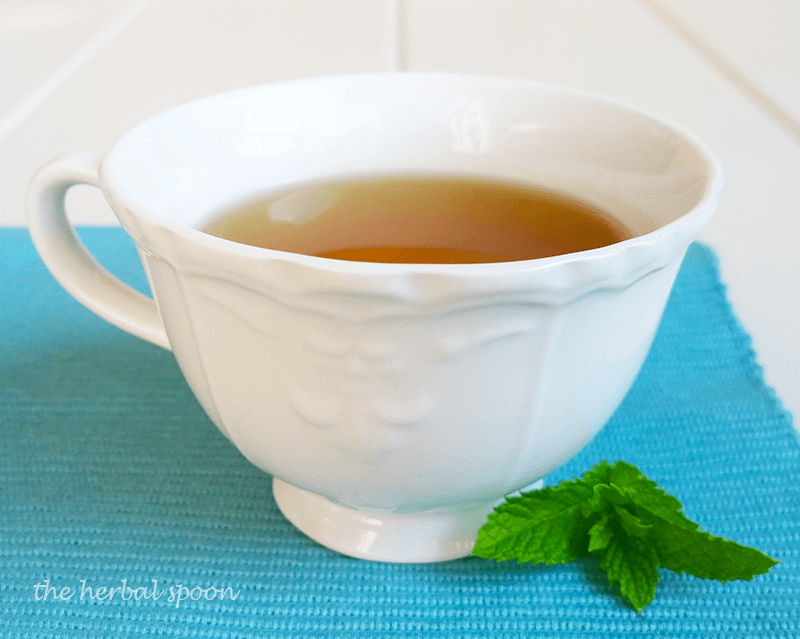
#20 Allergy Relief Herbal Tea
This is my go to recipe for allergy symptoms and it sure beats lilac scented drugs up the nose.
Peppermint is an activator herb to boost the effectiveness and reduce excess mucus. I’ve found that lavender essential oil is more effective than the herb as an antihistamine, so I prefer to use the oil. Locally sourced honey helps alleviate allergy symptoms and safely dilutes the lavender oil to prevent irritation.
Allergy tea ingredients:
- 1 tsp nettle leaf
- 1 tsp peppermint leaf (substitute nettle if breastfeeding or you have acid reflux)
- 2 tsp local raw or manuka honey
- 1 drop lavender essential oil
- 1 cup water
Allergy tea instructions:
- Combine the honey and lavender oil together in the bottom of a mug. Stir until the oil is well mixed in and looks like very tiny bubbles.
- Boil water in a pan, add the nettle and peppermint, turn off the heat and cover. Let the herbs steep for 5-10 minutes.
- Strain the tea into the mug and stir to combine.
- Sip as needed to relieve allergy symptoms.
Do you have allergy symptoms? Which home remedies for allergy relief have worked the best for you?
References:
- Anushiravani, M., Bakhshaee, M., Taghipour A., Mehri M. (2018). Comparison of the therapeutic effect of the Persian Medicine Protocol with the common treatment of chronic rhinosinusitis: a randomized clinical trial. Electron Physician. 10(7), 7017-7027. doi: 10.19082/7017.
- WebMD. (2018). How can I make my own saline solution for a neti pot?
- Choi, S. Park, K. (2016). Effect of Inhalation of Aromatherapy Oil on Patients with Perennial Allergic Rhinitis: A Randomized Controlled Trial. Evidence Based Complementary and Alternative Medicine. doi: 10.1155/2016/7896081
- Guibas, G., Spandou, E., Meditskou, S., Vyzantiadis, T., Priftis, K., Anogianakis G. (2013). N-acetylcysteine exerts therapeutic action in a rat model of allergic rhinitis. Int Forum Allergy Rhinol. 3(7), 543-9. doi: 10.1002/alr.21145
- Helms, S., Miller, A. (2006). Natural Treatment of Chronic Rhinosinusitis. Alternative Medicine Review, 11(3).
- Kresser, C. (2019). Got Allergies? Your microbes could be responsible.
- Lawless, J. (2013). The Encyclopedia of Essential Oils. San Francisco, CA: Conari Press.
- Li, C., Lin, H., Lin, C., Hsu, T., (2019). Effectiveness of Hypertonic Saline Nasal Irrigation for Alleviating Allergic Rhinitis in Children: A Systematic Review and Meta-Analysis. Journal of Clinical Medicine, 8(1), 64. doi: 10.3390/jcm8010064
- Lv, C., Zhang, Y., Shen, L. (2018). Preliminary Clinical Effect Evaluation of Resveratrol in Adults with Allergic Rhinitis. Int Arch Allergy Immunol.175(4):231-236. doi: 10.1159/000486959.
- McDonald, J. (n.d.). Surviving Sinusitis.
- Mercola. (2010). Does Drinking Milk Cause Upper Respiratory Congestion.
- Mills, S. & Bone, K. (1999). Principles and Practices of Phytotherapy. Churchill Livingstone.
- Mlcek, J., Jurikova, T., Skrovankova, S., Sochor, J. (2016). Quercetin and Its Anti-Allergic Immune Response. Molecules. 21(5), 623. doi: 10.3390/molecules21050623
- Mukherjee, S., Dudley, J., Dipak, D.(2010). Dose-Dependency of Resveratrol in Providing Health Benefits. Dose Response. 8(4), 478–500. doi: 10.2203/dose-response.09-015.Mukherjee
- National Institutes of Health (NIH), (2018). Vitamin C Fact Sheet for Health Professionals.
- Patterson, A., Yildiz, V., Klatt, M., Malarkey, W. (2014). Perceived stress predicts allergy flares. Annals of Allergy, Asthma, and Immunology, 112(4), 317–321. https://doi.org/10.1016/j.anai.2013.07.013
- Romm, A. (2018). Kick Your Allergies for Good by Healing Your Gut.
- Romm, A. (2018). An MD’s Top Natural Remedies for Seasonal Allergies.
- Scalbert, A. (2015). Phenol Explorer.
- Thomas, J. (2014). Is Glyphosate Responsible for Your Health Problems?
- Winston, D. & Maimes, S. (2007) Adaptogens: Herbs for Strength, Stamina, and Stress Relief. Rochester, VT: Healing Arts Press.